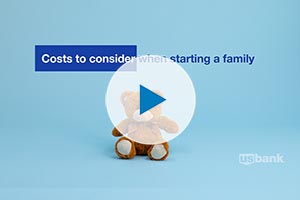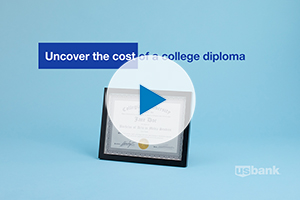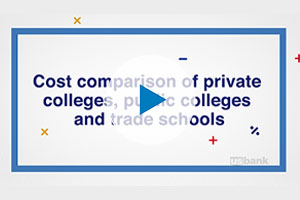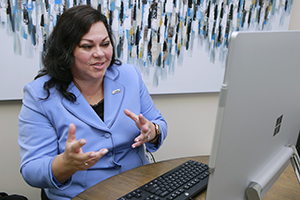
What is a home equity line of credit (HELOC) and what can it be used for?

Preparing for retirement: 8 steps to take

Multiple accounts can make it easier to follow a monthly budget

Year-end financial checklist

An investor’s guide to marketplace lending

What is a CLO?

Beyond Mars, AeroVironment’s earthly expansion fueled by U.S. Bank

ABL mythbusters: The truth about asset-based lending

Collateral options for ABL: What’s eligible, what’s not?

Can ABL options fuel your business — and keep it running?

Maximizing your infrastructure finance project with a full suite trustee and agent

Evaluating interest rate risk creating risk management strategy

Managing the rising costs of payment acceptance with service fees

3 reasons governments and educational institutions should implement service fees

Higher education and the cashless society: Latest trends

Tech lifecycle refresh: A tale of two philosophies

Changes in credit reporting and what it means for homebuyers

4 benefits of independent loan agents

At your service: outsourcing loan agency work

Middle-market direct lending: Obstacles and opportunities

Streamline operations with all-in-one small business financial support

Talent acquisition 101: Building a small business dream team

Make your business legit

How to fund your business without using 401(k) savings

How I did it: Turned my side hustle into a full-time job

Costs to consider when starting a business

How to test new business ideas

How to get started creating your business plan

How to establish your business credit score

Meet your business credit card support team

How jumbo loans can help home buyers and your builder business

When to consider switching banks for your business

How to choose the right business checking account

5 tips to help you land a small business loan

Break free from cash flow management constraints

Key components of a financial plan

5 financial goals for the new year

Good money habits: 6 common money mistakes to avoid

How to talk about money with your family

How to build wealth at any age

Retirement income planning: 4 steps to take

Retirement savings by age

Preparing for retirement: 8 steps to take

How I did it: Switched career paths by taking an unexpected pivot

Achieving their dreams through a pre-apprenticeship construction program

Do your investments match your financial goals?

Investment strategies by age

11 essential things to do before baby comes

Webinar: Uncover the cost: Starting a family

Preparing for adoption and IVF

Checklist: 10 questions to ask your home inspector

Closing on a house checklist for buyers

Checklist: financial recovery after a natural disaster

How does money influence your planning?

College budgeting: When to save and splurge

Webinar: 11 insider tips for student debt

Student checklist: Preparing for college

6 questions students should ask about checking accounts

Uncover the cost of a college diploma

How to save money in college: easy ways to spend less

The A to Z’s of college loan terms

Co-signing 101: Applying for a loan with co-borrower

Practical money skills and financial tips for college students

How to build credit as a student

5 things to know before accepting a first job offer

Learn to spot and protect yourself from common student scams

How I did it: Paid off student loans

Bank Notes: College cost comparison

Tips to earn that A+ in back-to-school savings

How to avoid student loan scams

Webinar: U.S. Bank asks: Are you safe from fraud?

What to do with your tax refund or bonus

Tips for handling rising costs from an Operation HOPE Financial Wellbeing coach

3 ways to keep costs down at the grocery store (and make meal planning fun)

5 tips for creating (and sticking to) a holiday budget

Friction: How it can help achieve money goals

5 things to consider when deciding to take an unplanned trip

Stay committed to your goals by creating positive habits

Growing your savings by going on a ‘money hunt’

Working with an accountability partner can help you reach your goals

A who’s who at your local bank

Webinar: 5 myths about emergency funds

How I did it: Learned to budget as a single mom

Your 5-step guide to financial planning

Does your savings plan match your lifestyle?

Uncover the cost: Wedding

What military service taught me about money management

Are savings bonds still a thing?

Tips to overcome three common savings hurdles

Adulting 101: How to make a budget plan

Helpful tips for safe and smart charitable giving

Personal loans first-timer's guide: 7 questions to ask

Allowance basics for parents and kids

Mindset Matters: How to practice mindful spending

How to save money while helping the environment

How can I help my student manage money?

How to manage money in the military: A veteran weighs in

You can take these 18 budgeting tips straight to the bank

Common unexpected expenses and three ways to pay for them

Do you and your fiancé have compatible financial goals?

U.S. Bank asks: Transitioning out of college life? What’s next?

U.S. Bank asks: Do you know your finances?

U.S. Bank asks: Do you know what an overdraft is?

Personal finance for teens can empower your child

It's possible: 7 tips for breaking the spending cycle

How to save for a wedding

Here’s how to create a budget for yourself

9 simple ways to save

7 steps to prepare for the high cost of child care

How compound interest works

Dear Money Mentor: How do I set and track financial goals?

5 tips for parents opening a bank account for kids

5 reasons why couples may have separate bank accounts

First-timer’s guide to savings account alternatives

Money Moments: 8 dos and don’ts for saving money in your 30s

30-day adulting challenge: Financial wellness tasks to complete in a month

What’s in your emergency fund?

Certificates of deposit: How they work to grow your money

Essential financial resources and protections for military families

What you need to know about renting

Dear Money Mentor: How do I pick a savings or checking account?

How to stop living paycheck to paycheck post-pay increase

Bank from home with these digital features

What financial advice would you give your younger self?

How grandparents can contribute to college funds instead of buying gifts

How to open and invest in a 529 plan

Using 529 plans for K-12 tuition

Your financial aid guide: What are your options?

Is a home equity loan for college the right choice for your student

Parent checklist: Preparing for college

How to apply for federal student aid through the FAFSA

What to consider before taking out a student loan

Are you ready to restart your federal student loan payments?

How to talk to your lender about debt

Everything you need to know about consolidating debts

How to use debt to build wealth

What’s a subordination agreement, and why does it matter?

Understanding the true cost of borrowing: What is amortization, and why does it matter?

Your quick guide to loans and obtaining credit

Dear Money Mentor: What is cash-out refinancing and is it right for you?

Overcoming high interest rates: Getting your homeownership goals back on track

What are conforming loan limits and why are they increasing

How I did it: Bought a home without a 20 percent down payment

Home buying myths: Realities of owning a home

Money Moments: Tips for selling your home

Money Moments: How to finance a home addition

How I did it: My house remodel

Is it the right time to refinance your mortgage?

What to know when buying a home with your significant other

These small home improvement projects offer big returns on investment

Should you get a home equity loan or a home equity line of credit?

Is a home equity line of credit (HELOC) right for you?

How to use your home equity to finance home improvements

How do I prequalify for a mortgage?

Can you take advantage of the dead equity in your home?

8 steps to take before you buy a home

6 questions to ask before buying a new home

4 questions to ask before you buy an investment property

10 uses for a home equity loan

Test your loan savvy

Credit: Do you understand it?

Should you give your child a college credit card?

Take the stress out of buying your teen a car

Questions to ask before buying a car

What you should know about buying a car

How to choose the best car loan for you

